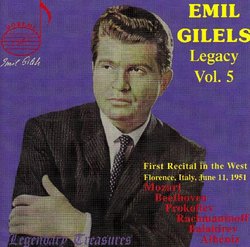| All Artists: Isaac Albeniz, Mily Balakirev, Ludwig van Beethoven, Wolfgang Amadeus Mozart, Sergey Prokofiev, Sergey Rachmaninov, Emil Gilels Title: Legacy, Vol. 5: First Recital in the West Members Wishing: 0 Total Copies: 0 Label: Doremi Records Release Date: 1/8/2002 Album Type: Import Genre: Classical Styles: Chamber Music, Forms & Genres, Fantasies, Short Forms, Sonatas, Historical Periods, Classical (c.1770-1830), Modern, 20th, & 21st Century, Romantic (c.1820-1910) Number of Discs: 1 SwapaCD Credits: 1 UPC: 723724314320 |
Search - Isaac Albeniz, Mily Balakirev, Ludwig van Beethoven :: Legacy, Vol. 5: First Recital in the West
 | Isaac Albeniz, Mily Balakirev, Ludwig van Beethoven Legacy, Vol. 5: First Recital in the West Genre: Classical
When Emil Gilels made his first appearance in the West--in Florence on June 11, 1951--at the height of the Cold War, he must have felt the weight of history riding on his shoulders. He was the first Soviet musician sent to... more » |
Larger Image |
CD Details
Synopsis
Amazon.com
When Emil Gilels made his first appearance in the West--in Florence on June 11, 1951--at the height of the Cold War, he must have felt the weight of history riding on his shoulders. He was the first Soviet musician sent to perform for Western audiences since Sergei Prokofiev had been entrusted with a similar mission 30 years earlier. As we can judge from Volume 5 in Doremi's Emil Gilels Legacy series, Gilels rose to the occasion magnificently. He opens Beethoven's "Appassionata" with great (though unexaggerated) pathos and progresses to climaxes of tremendous grandeur. His gale-force tempos in the finale may not scrupulously observe the composer's cautionary "Allegro ma non troppo," but Gilels never shortchanges the music's passion. He accelerates to an even more phenomenal tempo for the "Presto" in the coda, while negotiating it with laser-beam accuracy. The pianist plays the Russian works (by Prokofiev, Rachmaninov, and Balakirev) with his characteristic beauty of sound and magisterial command. Even in the furious onslaught of Islamey, Gilels still manages to make Balakirev's exotic textures luminous, glinting with colors that seem to come from another galaxy. The then 35-year-old pianist was not yet the stylish Mozartean he was to become 20 years later. Nevertheless, he invests each note in Mozart's anguished C Minor Sonata with a wealth of emotion. The result is a magical web of sounds--not authentically Mozartean by current standards, perhaps, but a performance in which the composer's profound humanity is palpable in its tenderness. --Stephen Wigler

 Track Listings (14) - Disc #1
Track Listings (14) - Disc #1